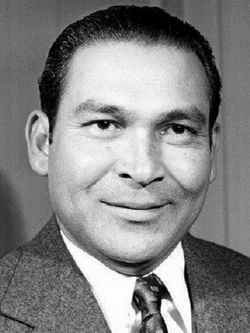
Cause of death: heart attack
Fulgencio Batista y Zaldívar (born Rubén Zaldívar; January 16, 1901 – August 6, 1973) was a Cuban military officer and politician who was the elected president of Cuba from 1940 to 1944 and military dictator of the country from 1952 until his overthrow in the Cuban Revolution in 1959.
Batista initially rose to power as part of the 1933 Revolt of the Sergeants, which overthrew the provisional government of Carlos Manuel de Céspedes y Quesada. Batista then appointed himself chief of the armed forces, with the rank of colonel, and effectively controlled the five-member "pentarchy" that functioned as the collective head of state. He maintained control through a series of puppet presidents until 1940, when he was elected president on a populist platform. He then instated the 1940 Constitution of Cuba and served until 1944. After finishing his term, Batista moved to Florida, returning to Cuba to run for president in 1952. Facing certain electoral defeat, he led a military coup against President Carlos Prío Socarrás that pre-empted the election.
Back in power and receiving financial, military and logistical support from the United States government, Batista suspended the 1940 Constitution and revoked most political liberties, including the right to strike. He then aligned with the wealthiest landowners who owned the largest sugar plantations, and presided over a stagnating economy that widened the gap between rich and poor Cubans. Eventually, it reached the point where most of the sugar industry was in U.S. hands, and foreigners owned 70% of the arable land. As such, Batista's repressive government then began to systematically profit from the exploitation of Cuba's commercial interests, by negotiating lucrative relationships both with the American Mafia, who controlled the drug, gambling, and prostitution businesses in Havana, and with large U.S.-based multinational companies who were awarded lucrative contracts. To quell the growing discontent amongst the populace—which was subsequently displayed through frequent student riots and demonstrations—Batista established tighter censorship of the media, while also utilizing his Bureau for the Repression of Communist Activities secret police to carry out wide-scale violence, torture and public executions. These murders mounted in 1957, as socialist ideas became more influential. While the exact numbers are unclear, it's believed the death toll is ranged between hundreds to up to 20,000.
Batista's efforts to quell the unrest proved not only ineffective, but his tactics were the catalyst to even wider resistance against his regime. During this time, revolutionary leaders Fidel Castro and Che Guevara, founders of the July 26th Movement began a resistance campaign that saw a combination of peaceful protests and guerrilla warfare in both rural and urban areas of Cuba between 1956 and 1958. After almost two years of fighting, rebel forces led by Guevara successfully defeated Batista's forces at the Battle of Santa Clara on New Year's Eve, 1958, effectively collapsing the regime. On January 1, 1959, Batista announced his resignation, fleeing the country to the Dominican Republic under the protection of Rafael Trujillo, before settling in Spain, spending the rest of his life in exile until his death in 1973.
Source : Wikipedia